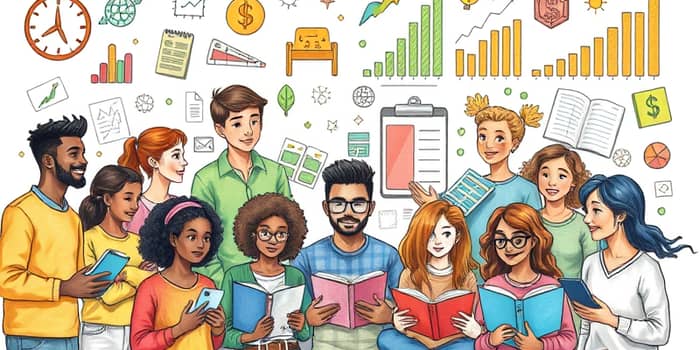In a rapidly evolving economic landscape, the journey toward financial confidence is not a destination but a continuous expedition. Financial education empowers individuals to navigate uncertainties, seize opportunities, and cultivate lasting wealth. This article explores how ongoing learning can transform lives, communities, and economies.
Why Financial Education Matters
Financial education serves as the foundation for informed decision-making and risk management that empowers individuals to pursue personal goals such as buying a home, funding education, or planning a secure retirement. By building skills in budgeting, investing, and credit management, people can avoid costly mistakes and build resilience against unexpected challenges.
Research underscores the value of this lifelong learning journey. A meta-analysis involving 76 studies across 33 countries and more than 160,000 participants revealed a medium to large effect size for well-designed financial education programs. Participants demonstrated improved budgeting habits, increased savings rates, and more responsible credit use, establishing a strong case for sustained investment in educational initiatives.
Employers also reap substantial rewards. By offering financial wellness programs, organizations report reduced employee stress, higher retention rates, and improved productivity. Financially secure employees are more focused, engaged, and better equipped to make informed decisions about benefits and retirement planning.
Beyond individual and workplace advantages, financial education shapes broader economic stability. When individuals save and invest wisely, they contribute to capital formation, fueling business expansion and job creation. In turn, prosperous households strengthen national economies by boosting consumption and reducing poverty levels.
- Enhances resilience against financial fraud and identity theft
- Promotes responsible borrowing and sustainable savings habits
- Supports workplace productivity through reduced financial stress
- Fosters economic growth by increasing capital availability
Core Topics for Lifelong Learning
To build a comprehensive financial foundation, education must span diverse topics that adapt to each life stage. From navigating entry-level budgeting to mastering complex investment strategies, core areas of focus include:
This structured approach ensures learners acquire both foundational insights and specialized expertise, enabling them to make strategic financial choices at every stage of life.
Effective Delivery Methods and Best Practices
Education is most impactful when it meets individuals where they are and addresses immediate needs. Incorporating technology, personalized coaching, and timely resources can significantly enhance engagement and retention.
- Formal education through schools and universities
- Workplace training and employer-sponsored seminars
- Online courses, webinars, and interactive platforms
- Personalized one-on-one financial coaching
- just-in-time learning aligned with life events for maximum relevance
When content is delivered through multiple modalities—combining video tutorials, interactive quizzes, and peer discussions—learners benefit from reinforced understanding and practical application. Case studies show that participants in blended programs are more likely to implement new strategies and achieve measurable improvements in savings and debt reduction.
Moreover, leveraging mobile apps and AI-driven tools offers learners personalized feedback and adaptive lesson plans. These innovations enable individuals to track their progress, receive targeted advice, and adjust learning pathways to align with shifting goals and life circumstances.
Overcoming Challenges and Embracing Innovation
Despite its profound benefits, continuous financial education faces barriers that must be addressed to achieve universal impact. Access disparities, elective program status, and digital literacy gaps can limit reach and effectiveness. Governments, organizations, and educators must collaborate to develop inclusive strategies.
According to OECD reports, more than 60 countries have adopted national strategies for financial education, reaching over five billion people. Yet, differences in socioeconomic background and regional infrastructure still pose challenges. Bridging the digital divide is essential to ensure that remote and underserved communities gain equal access to high-quality resources.
Innovations in fintech and digital banking present both challenges and opportunities. As financial products evolve, educational content must adapt, covering emerging topics such as cryptocurrencies, peer-to-peer lending, and app-based investment platforms. Embracing technology-driven solutions, such as AI-powered tutors and gamified learning apps, can drive engagement while ensuring accuracy and personalization.
Collaborative efforts between public institutions and private enterprises can accelerate progress. Initiatives like community workshops, employer partnerships, and subsidized online courses can lower barriers and foster a culture of lifelong learning. By fostering partnerships across sectors, stakeholders can deliver programs that are both scalable and tailored to diverse populations.
Moreover, early education is crucial. Introducing financial concepts in high school equips young adults to navigate student loans, credit card offers, and initial wage negotiations with confidence. This proactive approach yields compound knowledge benefits over time, much like the compounding effect in financial markets.
Cultivating a Growth Mindset
Achieving financial mastery demands curiosity, humility, and perseverance. Embrace mistakes as opportunities to learn, seek feedback from trusted advisors, and set incremental goals that build confidence and momentum. A growth mindset transforms obstacles into stepping stones and fosters a lifelong passion for self-improvement.
Conclusion
Continuous financial education is not merely a series of lessons, but a dynamic partnership between individuals, educators, and institutions. By committing to lifelong learning, people can build resilience, seize opportunities, and secure their financial futures. This journey requires dedication, adaptability, and a willingness to embrace change.
Whether you are just starting your financial path or seeking to refine advanced strategies, remember that every insight gained contributes to a more stable, prosperous life. Start today—explore resources, connect with mentors, and cultivate an ongoing process of acquiring, updating, and applying knowledge that will serve you for decades.
References
- https://www.investopedia.com/terms/f/financial-literacy.asp
- https://www.finance-watch.org/blog/financial-education-the-what-the-how-the-why/
- https://www.oncourselearning.com/resources/benefits-financial-literacy
- https://extension.umd.edu/resource/concept-financial-education-fs-2024-0704
- https://engageforsuccess.org/the-benefits-of-financial-literacy-training-in-the-workplace/
- https://papersowl.com/examples/importance-of-financial-education-in-high-school/
- https://www.mapfre.com/en/insights/economy/impact-financial-education-countrys-economy/










